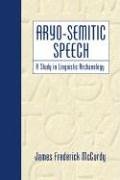Search -
Aryo-Semitic Speech: A Study in Linguistic Archaeology
AryoSemitic Speech A Study in Linguistic Archaeology
Author:
Purchase of this book includes free trial access to www.million-books.com where you can read more than a million books for free. This is an OCR edition with typos. Excerpt from book: The inherent difficulties of this branch of the investigation are that we do not know the roots of the numerals, and that the further back we go to their primary... more »
Author:
Purchase of this book includes free trial access to www.million-books.com where you can read more than a million books for free. This is an OCR edition with typos. Excerpt from book: The inherent difficulties of this branch of the investigation are that we do not know the roots of the numerals, and that the further back we go to their primary... more »
ISBN-13: 9781592448234
ISBN-10: 1592448232
Publication Date: 8/1/2004
Pages: 192
Rating: ?
ISBN-10: 1592448232
Publication Date: 8/1/2004
Pages: 192
Rating: ?
0 stars, based on 0 rating
Publisher: Wipf & Stock Publishers
Book Type: Paperback
Members Wishing: 1
Reviews: Amazon | Write a Review
Book Type: Paperback
Members Wishing: 1
Reviews: Amazon | Write a Review




